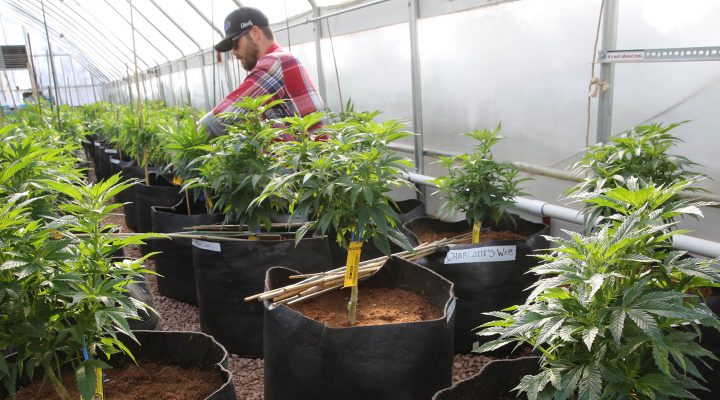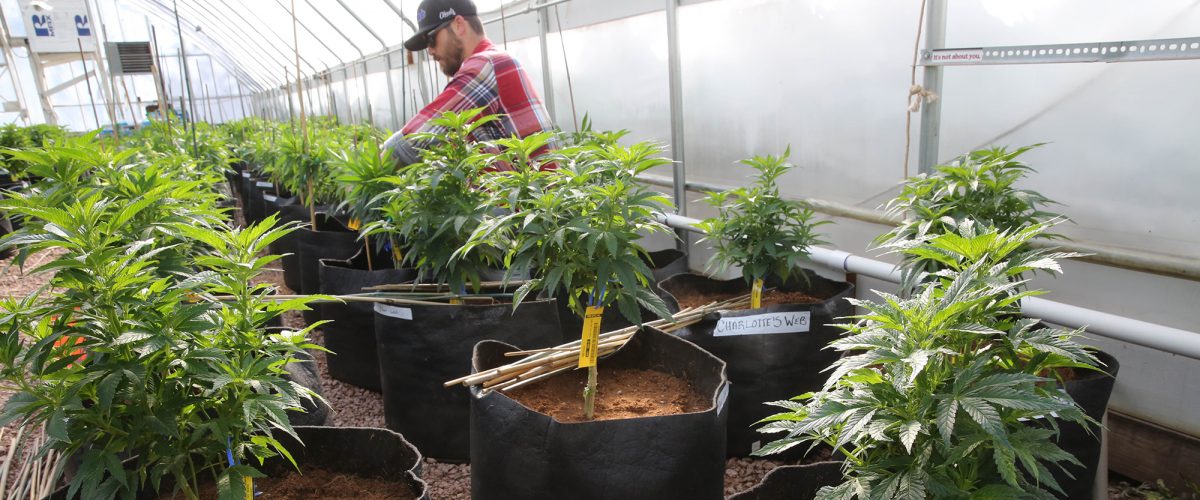The six Stanley brothers were taught that marijuana was bad news, both at church and at Colorado Springs Christian School. But after pot helped their cancer-stricken cousin Ron, the brothers entered the medical marijuana business to work with “God’s plant.”
When one marijuana harvest was particularly low in THC — the chemical that gives marijuana its “buzz” — they called it “Hippie’s Disappointment.” But the poor-selling strain was high in CBD, the ingredient that can help people with insomnia, anxiety and chronic pain.
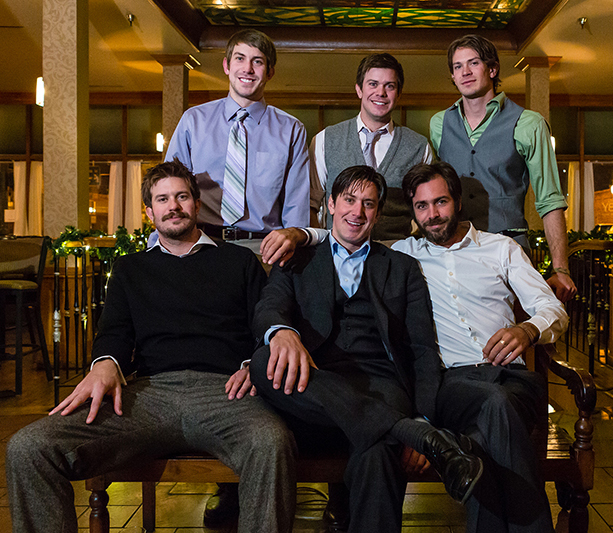
The Stanley brothers pose for a photograph in December, 2014. Back Row: J. Austin, Jordan, Jared; front row: Jesse, Joel, Jon Stanley. (Photo courtesy of Stanley Brothers)
Hippie’s Disappointment would become a marijuana miracle in 2012 when it was found to stop the hundreds of epileptic seizures a young girl named Charlotte suffered every week.
Over the next few years, 500 families moved to Colorado so they could treat their kids with Charlotte’s Web, which was illegal in their home states. In 2013, the Stanleys founded and began funding a nonprofit called Realm of Caring to help them.
Times have changed. Last fall, the Stanleys’ company signed the first-ever partnership between a cannabis/hemp brand and a professional sports league, making Charlotte’s Web the “Official CBD of Major League Baseball.”
And medical marijuana is now legal in 38 states, due in part to advocacy by Realm of Caring and its marijuana moms.
Now, Realm of Caring is celebrating its first decade with a report on its achievements, including millions of dollars in aid for hundreds of CBD pilgrims.
But the group isn’t stopping there. Its sister organization is now doing pioneering research on the medical benefits of another powerful drug: psilocybin, the naturally occurring compound found in psychedelic mushrooms, or fungi.
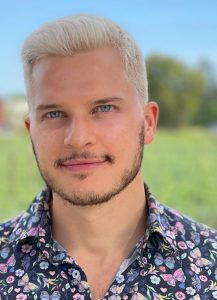
Matthew X. Lowe
“Psychedelics have a long history of being intermixed with religion and have been used in religious ceremonies for thousands of years,” said Matthew X. Lowe, who leads Realm of Caring’s offshoot, Unlimited Sciences.
A community of healing grows
You can’t keep a good miracle down. Here’s how Paige Figi, Charlotte’s mother, put it: “I was seeing Charlotte’s story over and over. Kids were walking out of wheelchairs. Doctors were astounded. After witnessing all this with my own eyes, I realized I couldn’t stand idly by and do nothing.”
Word of mouth spread quickly. CNN’s Sanjay Gupta provided the first major news media exposure, soon followed by other national and international media outlets.
“Relieving their children’s suffering was worth it.”
For the hundreds of families who uprooted their lives for Charlotte’s Web, relieving their children’s suffering was worth it. Once in Colorado, Realm of Caring provided a home away from home and a way for moms to volunteer and help the new families as they arrived. In addition to the many evangelical Christian families there were Muslims and Jews.
Realm of Caring’s mission was to improve families’ quality of life, do research on the impact of marijuana with Johns Hopkins University School of Medicine, educate parents and advocate for medical marijuana laws. Its 2013-2023 Impact Report summarizes the results:
- $3.5 million in grants, discounts and products were given to thousands of critically ill children.
- A database of more than 72,000 clients from around the world who have set up free accounts to seek the group’s information and help was created.
- Call center operators spent 2.5 million minutes on phones offering personal support to people who requested information.
- An Observational Research Registry emerged with 4,000 participants to monitor more than 100 health conditions impacted by cannabis.
- Realm of Caring continues to register participants for its studies of various groups and is continuing a study of CBD with female military veterans.
But the group’s impact has been even greater than that.
Moms who were forced to move to Colorado to care for their kids became passionate advocates for changing medical marijuana laws in their home states. Over the course of 18 busy months, Colorado’s cannabis crusaders helped change laws in 19 states: Alabama, Florida, Georgia, Iowa, Kentucky, Maryland, Minnesota, Mississippi, Missouri, New York, North Carolina, Oklahoma, South Carolina, Tennessee, Texas, Utah, Virginia, Wisconsin and Wyoming. The group is now combatting efforts to roll back medical marijuana laws in Florida and Virginia.
Converting Mormons and Baptists
Their initial state victory came in Utah, where Mormons had enacted some of the nation’s most restrictive alcohol laws. Charlee’s Law, named after a Utah child with epilepsy, was signed into law in March 2014, a century after the state outlawed marijuana.
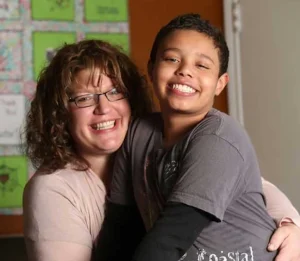
Heather Jackson with Zaki
“This was our first indication that we can actually do this,” said Heather Jackson, a Christian who was Realm of Caring’s former director.
Jackson’s son Zaki suffered hundreds of seizures, which led to the nontraditional treatment. She spoke about her son, her work and her faith at the 2016 Q Conference in Denver.
Jackson and Figi also converted many a conservative Christian Republican legislator, including Georgia state Rep. Allen Peake, a Southern Baptist who championed his state’s medical marijuana bill, Haleigh’s Hope Act, which was signed into law in April 2015.
“I’m a Christian guy, so to even get into this space has been a significant paradigm shift for me,” Peake said in 2016. “But this is a compassion issue for me. Christ commands us to care for the sick.”
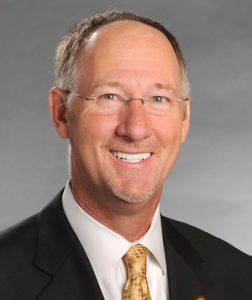
Allen Peake
Peake traveled to Colorado to meet families who left Georgia to get their kids Charlotte’s Web. On his return flight to Georgia, Peake practiced civil disobedience, taking bottles of the oil back with him for families who needed it.
Peake even founded a charity called Journey of Hope that provides Georgia families with financial assistance so they can relocate to Colorado.
“I’m willing to do whatever it takes to give them access,” said Peake, who condemns the “lunacy” of federal drug laws that “make criminals out of parents and citizens who only want medicine to improve the quality of their lives.”
The U.S. Drug Enforcement Administration continues to categorize cannabis, along with heroin and LSD, as a Schedule I drug with “no currently accepted medical use and a high potential for abuse.”
A search for “marijuana” on the Southern Baptist Convention website yields one result: a June 1973 “Resolution On Alcohol And Other Drugs” responding to a rise in drug and alcohol use in the 1960s, including “an alarmingly developing culture involving marijuana and other illegal drugs.”
Making history with Major League Baseball
Charlotte’s Web’s partnership deal with America’s sport came after formulating Charlotte’s Web SPORT, which meets MLB’s scientific benchmarks and no-banned substances policy and features the MLB logo on every bottle. The Stanleys harvest the CBD for their products from Colorado-grown hemp, which contains hardly any THC.
 MLB said the product, available in tinctures, gummies, topicals and oral sprays, “aims to benefit athletes’ wellness in four areas: supporting recovery, helping sleep cycles, maintaining focus and helping them stay calm under pressure.
MLB said the product, available in tinctures, gummies, topicals and oral sprays, “aims to benefit athletes’ wellness in four areas: supporting recovery, helping sleep cycles, maintaining focus and helping them stay calm under pressure.
“Charlotte’s Web products, which receive the NSF Certified for Sport designation, have met the highest safety standards and can be promoted across MLB events and media platforms. We are excited about the possibilities this partnership offers as CBD becomes a more widely adopted part of the health and wellness regimen of our players and fans.”
U.S. women’s soccer star Carli Lloyd has endorsed Charlotte’s Web, and athletes including former NBA star Kevin Garnett have spoken about their use of CBD as players.
“Athletes aren’t waiting, athletes want to access these products, which is why we commend MLB for recognizing that and trying to find a safe product that they can recommend,” said Charlotte’s Web co-founder Jared Stanley.
Exploring psychedelics: God’s other plant
Today, 71% of the people calling Realm of Caring’s call center are adults inquiring about their own marijuana use, and its former leader is blazing new trails.
Charlotte’s Web continued to help Heather Jackson’s son Zaki until he hit puberty. After his seizures returned, mom suffered a breakdown which neither prayer nor therapy could heal. That’s when she tried psilocybin, the compound found in psychedelic mushrooms that has been part of indigenous religious celebrations for centuries.
“Cannabis saved my kid, psychedelics saved me.”
As Jackson explained in a recent article: “Cannabis saved my kid, psychedelics saved me.”
The research, which will appear soon in peer-reviewed articles, showed “broad therapeutic potential of psilocybin to produce lasting improvements in mental health symptoms,” including “persisting reductions in anxiety and depression, along with changes in many other facets of psychological health, well-being and spiritual well-being.”
Research also uncovered a variety of risks to a minority of patients who had negative experiences with psilocybin: 1% required medical care; nearly 4% needed psychiatric care for one to three days after taking the drug; fewer than 5% reported mood fluctuations.
Realm of Caring now continues the research through its sister organization, Unlimited Sciences, the only nonprofit authorized to conduct such work by Institutional Review Boards operating under FDA regulations, Lowe said.
Realm of Caring’s mission remains the same as a decade ago, even as the plants it researches change, he said. “Psychedelics are the next frontier for mental health treatment. As with cannabis, we’re bringing evidence-based education and awareness to the public.”
Related articles:
Majority of Americans favor legalizing marijuana but holdouts are older, religious and conservative
Quakers join the applause for Biden’s federal pardon of simple marijuana possession

